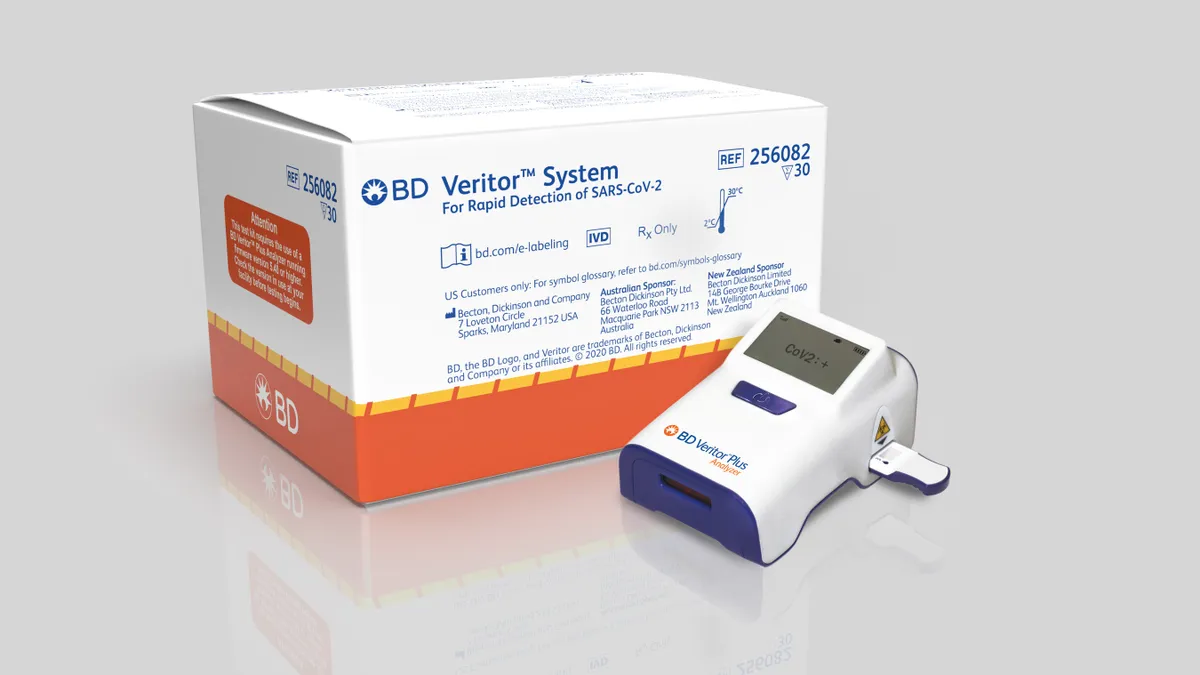Dive Brief:
- Becton Dickinson on Thursday reported first fiscal quarter revenues of $5 billion, a 5.9% decrease on a reported basis due to a $681 million year-over-year decline in COVID-only testing revenues. BD’s testing decline was in line with past guidance, however, and the company still beat Wall Street revenue expectations by $240 million last quarter.
- CEO Tom Polen told investors that BD "was able to deliver these results in an uncertain market environment" in the first quarter across its medical, life sciences and interventional businesses, growing the company's base business revenues by 8.3%. Polen noted that BD saw increased demand in the quarter for its professional and at-home COVID-19 tests fueled by the omicron variant surge. However, the CEO said that compared to last year, COVID-only diagnostics revenues declined, "driven by lower antigen test pricing and volumes" as well as increased competition from over 40 rapid tests with emergency use authorizations in the U.S. market.
- BD raised its full-year guidance and is now expecting revenues to be in the range of $19.55 billion to $19.75 billion compared to the $19.47 billion consensus, an increase of approximately $250 million from what was previously announced. Evercore ISI analysts in a Thursday note said BD's fiscal 2022 guidance increase seems conservative given that it amounts to the magnitude of the company's about $250 million first-quarter beat.
Dive Insight:
BD is facing the same challenges that other medical device companies have commented on this earnings season, including the omicron surge, healthcare staffing shortages, supply chain constraints and inflationary pressures.
Despite the ongoing pandemic and macroeconomic challenges, Polen on Thursday said the global healthcare system is "more agile and better prepared as each new variant has emerged." The CEO noted that fiscal first-quarter healthcare utilization levels were similar to those seen in the fiscal fourth quarter of 2021 "remaining slightly below pre-pandemic levels until mid-December, then only declining modestly as a result of omicron."
While BD saw a slowdown in nonemergent procedures in the second half of December due to hospital restrictions and staffing shortages, Polen said that "overall our customers were able to continue to provide care to support patients and sustain a solid base of deferrable procedures," adding that these challenges to procedure levels "had minimal impact on our business in the first quarter."
Polen said healthcare staffing shortages are impacting the delivery of some deferrable procedures and that BD is grappling with supply chain constraints and inflationary pressures. "We see signs of continued pressure on shipping, labor, raw materials and electronic components over the remainder of the year since our last guidance update," the CEO said.
In November, when BD announced fourth fiscal quarter and full year 2021 results, the company provided first fiscal quarter guidance that assumed approximately $200 million in COVID-19-only diagnostic testing revenues. It came in at $185 million, down from $866 million in the prior year. CFO Christopher DelOrefice told investors on Thursday that BD's total year-over-year 5.9% first-quarter revenue decrease was "entirely attributable to the decline in testing revenues."
Nonetheless, looking ahead, Polen said BD now has "the confidence" to raise full-year revenue guidance for both its base business and COVID-19 testing "while remaining appropriately prudent, given the current uncertain environment."
At the same time, the CEO called the recent demand surge for coronavirus diagnostics "temporary" adding that if virus cases "persist longer than anticipated" the company's test portfolio will provide a "natural hedge against deferrable procedure softness and other COVID-related headwinds."
On Tuesday, BD announced its board of directors recently approved the planned spinoff of its diabetes care business, called Embecta, which is slated to occur on April 1.
Polen on Thursday said Embecta, which will operate as an independent company, will be one of the world's largest "pure play" dedicated diabetes companies and will allow BD to focus on its core businesses and high-growth opportunities.
The CEO added that the spinoff will not have an impact on BD's long-term growth targets the company laid out at its investor day in November, including plans to spend $2 billion a year on tuck-in acquisitions and to double sales from new products by 2025.











